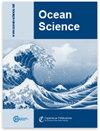在基于能量预算的涡旋参数计算中使用相对风应力引起的涡旋能量耗散率约束
IF 3.3
3区 地球科学
Q2 METEOROLOGY & ATMOSPHERIC SCIENCES
引用次数: 0
摘要
摘要本文推导了大尺度风场和中尺度洋流相互作用引起的地营涡动能量耗散率,即相对风应力,用于基于涡动能量预算的涡动参数计算。在这项工作中,我们首先通过分析推导出相对风应力阻尼项和气压沿岸地转漩涡能量方程。我们将分析得出的漩涡能量在相对风应力阻尼作用下的时间演化与反气旋和气旋大气环流模式中的条气漩涡进行了直接比较。尽管数值模式在第 150 天左右与分析模型出现分歧,可能是由于存在非线性条带过程,但每种模式和涡流类型的涡流能量耗散情况相当。然后,利用分析漩涡能量预算中的术语,提出了由相对风应力引起的约束耗散率。这种耗散率取决于涡热跃层位移的势能,而势能也取决于涡的长度尺度。利用一系列海洋数据集,并计算两种形式的涡长尺度,提出了耗散率的一系列数值。分析发现,耗散率是以往研究中使用的恒定耗散率的 0.25 至 4 倍。南大洋的耗散率普遍增大,但西部边界的耗散率较小。提出的耗散率为粗分辨率全球气候模式中总涡旋能量的阻尼参数化提供了一个工具,并可能对广泛的气候过程产生影响。本文章由计算机程序翻译,如有差异,请以英文原文为准。
Constraining an eddy energy dissipation rate due to relative wind stress for use in energy budget-based eddy parameterisations
Abstract. A geostrophic eddy energy dissipation rate due to the interaction of the large-scale wind field and mesoscale ocean currents, or relative wind stress, is derived here for use in eddy energy budget-based eddy parameterisations. We begin this work by analytically deriving a relative wind stress damping term and a baroclinic geostrophic eddy energy equation. The time evolution of this analytical eddy energy in response to relative wind stress damping is compared directly with a baroclinic eddy in a general circulation model for both anticyclones and cyclones. The dissipation of eddy energy is comparable between each model and eddy type, although the numerical model diverges from the analytical model at around day 150, likely due to the presence of non-linear baroclinic processes. A constrained dissipation rate due to relative wind stress is then proposed using terms from the analytical eddy energy budget. This dissipation rate depends on the potential energy of the eddy thermocline displacement, which also depends on eddy length scale. Using an array of ocean datasets, and computing two forms for the eddy length scale, a range of values for the dissipation rate are presented. The analytical dissipation rate is found to vary from 0.25 to 4 times that of a constant dissipation rate employed in previous studies. The dissipation rates are generally enhanced in the Southern Ocean but smaller in the western boundaries. This proposed dissipation rate offers a tool to parameterise the damping of total eddy energy in coarse resolution global climate models and may have implications for a wide range of climate processes.
求助全文
通过发布文献求助,成功后即可免费获取论文全文。
去求助
来源期刊

Ocean Science
地学-海洋学
CiteScore
5.90
自引率
6.20%
发文量
78
审稿时长
6-12 weeks
期刊介绍:
Ocean Science (OS) is a not-for-profit international open-access scientific journal dedicated to the publication and discussion of research articles, short communications, and review papers on all aspects of ocean science: experimental, theoretical, and laboratory. The primary objective is to publish a very high-quality scientific journal with free Internet-based access for researchers and other interested people throughout the world.
Electronic submission of articles is used to keep publication costs to a minimum. The costs will be covered by a moderate per-page charge paid by the authors. The peer-review process also makes use of the Internet. It includes an 8-week online discussion period with the original submitted manuscript and all comments. If accepted, the final revised paper will be published online.
Ocean Science covers the following fields: ocean physics (i.e. ocean structure, circulation, tides, and internal waves); ocean chemistry; biological oceanography; air–sea interactions; ocean models – physical, chemical, biological, and biochemical; coastal and shelf edge processes; paleooceanography.
 求助内容:
求助内容: 应助结果提醒方式:
应助结果提醒方式:


